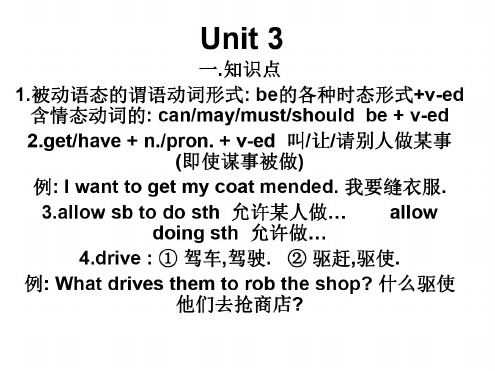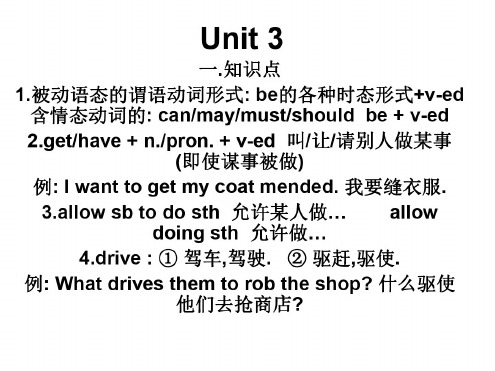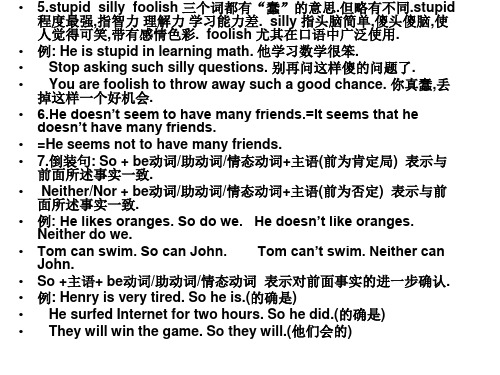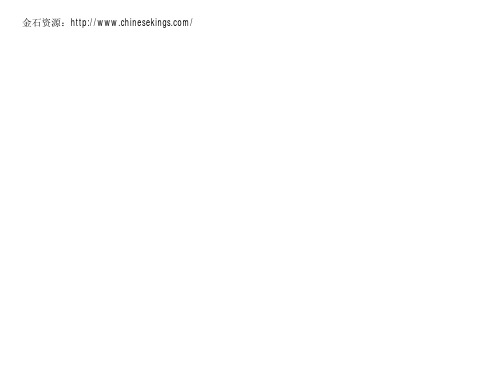- 1、下载文档前请自行甄别文档内容的完整性,平台不提供额外的编辑、内容补充、找答案等附加服务。
- 2、"仅部分预览"的文档,不可在线预览部分如存在完整性等问题,可反馈申请退款(可完整预览的文档不适用该条件!)。
- 3、如文档侵犯您的权益,请联系客服反馈,我们会尽快为您处理(人工客服工作时间:9:00-18:30)。
• 21.English-English dictionary 英英词典 • 22. have an opportunity to do sth 有做…的机会 23.eight hours’ sleep a night 每晚8小时的睡眠 • 24. an old people’s home 敬老院 25. take time to do sth 花费时间干… • 26. primary schools 小学 27. have…off 放假,休息 • 28. reply to 回答,答复 29. get in the way of 妨碍 • 30. a professional athlete 职业运动员 31. achieve one’s dreams 实现梦想 • 32. think about 思考,考虑 33. in the end 最后,终 于 • 34. be serious about 对…热忠/极感兴趣 • 35. spend…on + n. spend …(in) + v-ing 在…上花费时 间/金钱 • 36. care about 关心,担心,在乎 37. agree with 同 意…
• 19. reply 与 answer 两者有时可通用. reply比answer正 式,一般指经过思考的.有针对性的,详细的回答,往往与to连 用.answer是一般用语,可直接带宾语. • 另外answer还有“应答”之意.如answer the door/telephone • 20. get in the way (of)... 妨碍... • 例: He never gets in others’ way. 他从不妨碍别人. • The bikes over there will get in the way of others. 自行车放在那里会妨碍别人的. • 21. success (n.) successful (adj.) succeed (v.) • 22. do does did 用在另一个动词前表示强调. • 例: He does speak well. 他真的讲的很好. Do be quiet. 务必安静. • 23. in the end = finally = at last 最后. • 24. importance (n.) important (adj.) • 25. be serious about 对…热忠/极感兴趣. • 例: I’m serious about the problem. • To tell you the truth, I’m not serious about math at all.
Unit 3
一.知识点 1.被动语态的谓语动词形式: be的各种时态形式+v-ed 含情态动词的: can/may/must/should be + v-ed 2.get/have + n./pron. + v-ed 叫/让/请别人做某事 (即使谋事被做) 例: I want to get my coat mended. 我要缝衣服. 3.allow sb to do sth 允许某人做… allow doing sth 允许做… 4.drive : ① 驾车,驾驶. ② 驱赶,驱使. 例: What drives them to rob the shop? 什么驱使 他们去抢商店?
• 6.The two pairs of jeans both look good on me. 这两条牛仔裤穿在我身上都适合. • 7.The classroom is a real mess. 教室太脏了. • 8.Should I be allowed to make my own decisions? • 9.Only then will I have a chance of achieving my dream. 只有这样我才能实现我的梦想 . • 10.They should be allowed to practice their hobbies as much as they want.应该允许他们 对业余爱好想练多长时间就练多长时间. • 11.We have nothing against running. 我们没 有理由反对他跑步
• 三.句子
• 1. I don’t think twelve-year-olds should be allowed to get their ears pierced. • 我认为不应该允许12岁的孩子穿耳孔. • 2.They talk instead of doing homework. 他们 聊天而不是做作业. • 3.He is allowed to stay up until 11:00 pm. 允 许他们熬到晚上11点. • 4.We should be allowed to take time to do things like that more often. • 我们应该被允许更加经常的花些时间多做这类事 情. • 5.What school rules do you think should be changed? • 你认为学校的哪些制度应该改一改了?
二.短语
• 1. be allowed to do sth 被允许干… allow sb to do sth 允许 某人干… allow doing sth 允许干… • 2. sixteen-year-olds = sixteen-year-old boys and girls 16岁 的孩子 • 3. part-time jobs 兼职工作 4. a driverபைடு நூலகம்s license 驾照 • 5. on weekends 在周末 6. at that age 在那个年龄段 • 7. on school nights 在上学期间的每个晚上 • 8. clean up (相当与及物动词) 清扫 9. stay up熬夜 • 10. fail (in) a test 考试不及格 • 11. take the test 参加考试 12. the other day 前几天 • 13. all my classmates 我所有的同学 • 14. in groups 成群的,按组的 • 15 concentrate on 全神贯注于 16. be good for 对…有益 17. get noisy 吵闹(系表结构) 18. learn from 向某人学习 • 19. at present 目前,现在 20. at least 至少
• 8.until 用于肯定句中,前面句子中的谓动必须是延续性的. • 9.clean (v.) 打扫,清理 clean up 比较彻底地打扫,清理 clean out 打扫,清理地最彻底. • 10.fail a test = fail in a test 考试不及格 • 11.be strict with+人. be strict in+事物. • 例: The head teacher is strict with his students He is strict in the work. • 12.the other day 前几天,不久前的一天.(用于过去时) • 13.concentrate on… 全神贯注做… • 例: This company concentrates on China market. 这 家公司把重点放在中国市场上. • 14. more…than…①与其说…不如说…; 比…更… • 例: The man is more stupid than nervous.与其说那人 紧张,倒不如说他愚蠢. • ②在这一结构中,more做adj. 修饰名词,表示“比…多” • 例:I have more books than you. 我的书比你的多.
• 5.stupid silly foolish 三个词都有“蠢”的意思.但略有不同.stupid 程度最强,指智力 理解力 学习能力差. silly 指头脑简单,傻头傻脑,使 人觉得可笑,带有感情色彩. foolish 尤其在口语中广泛使用. • 例: He is stupid in learning math. 他学习数学很笨. • Stop asking such silly questions. 别再问这样傻的问题了. • You are foolish to throw away such a good chance. 你真蠢,丢 掉这样一个好机会. • 6.He doesn’t seem to have many friends.=It seems that he doesn’t have many friends. • =He seems not to have many friends. • 7.倒装句: So + be动词/助动词/情态动词+主语(前为肯定局) 表示与 前面所述事实一致. • Neither/Nor + be动词/助动词/情态动词+主语(前为否定) 表示与前 面所述事实一致. • 例: He likes oranges. So do we. He doesn’t like oranges. Neither do we. • Tom can swim. So can John. Tom can’t swim. Neither can John. • So +主语+ be动词/助动词/情态动词 表示对前面事实的进一步确认. • 例: Henry is very tired. So he is.(的确是) • He surfed Internet for two hours. So he did.(的确是) • They will win the game. So they will.(他们会的)
• 26. only 处于句首,并后跟状语时,全句需要倒装. • 例: Only then did he understand it. 只有到那时, 他才明白. • Only in this way can we learn English well. 只有这样我们才能把英语学好. • Only when she came home, did he learn the news. 当她到家时,他才得知了这消息. • 27. care about 关心,在乎,在意. • 例: No one cares about others nowadays. 现在没人关心别人. • I don’t care about what he does. 我并不在 意他干什么. • 28. clothes 统指身上穿的各种服装,包括上衣,裤 子,内衣等,做主语,谓语动词按复数处理. • clothing 不可数名词,是服装的总称,包括各种衣 服,帽子,鞋袜等.做主语谓动按单三处理. cloth 布料.





